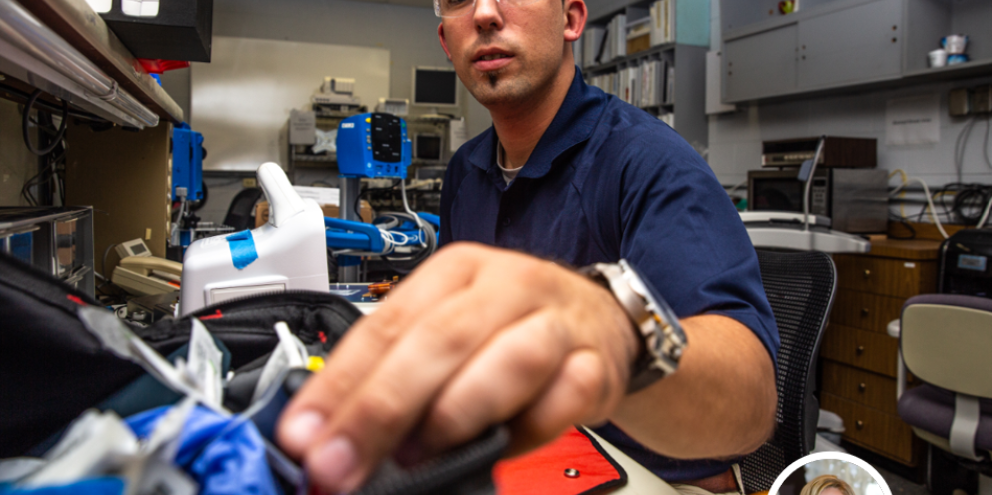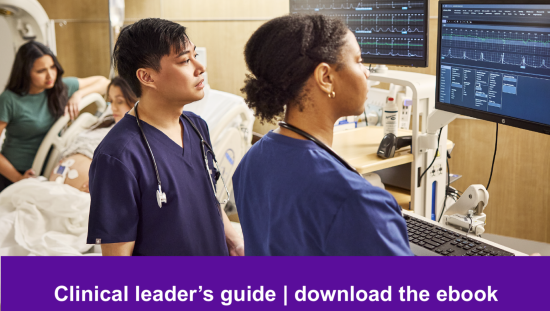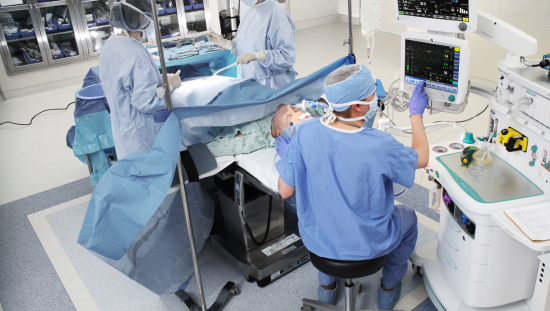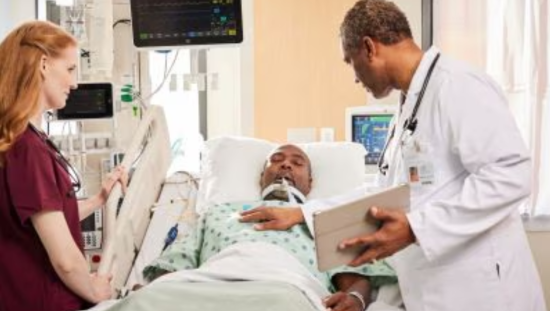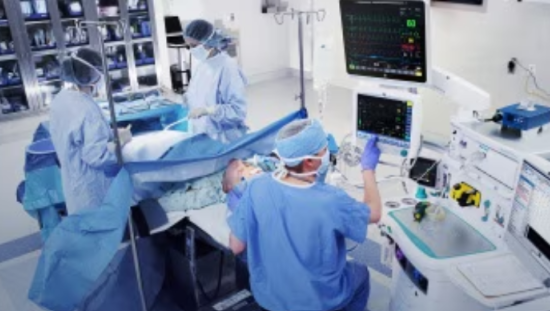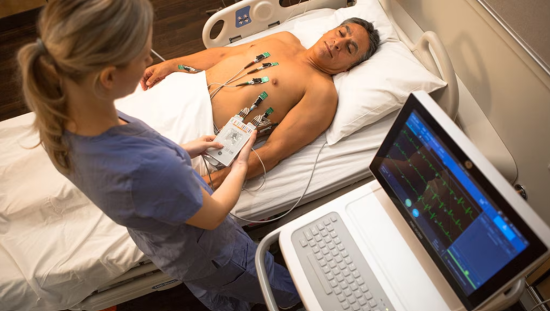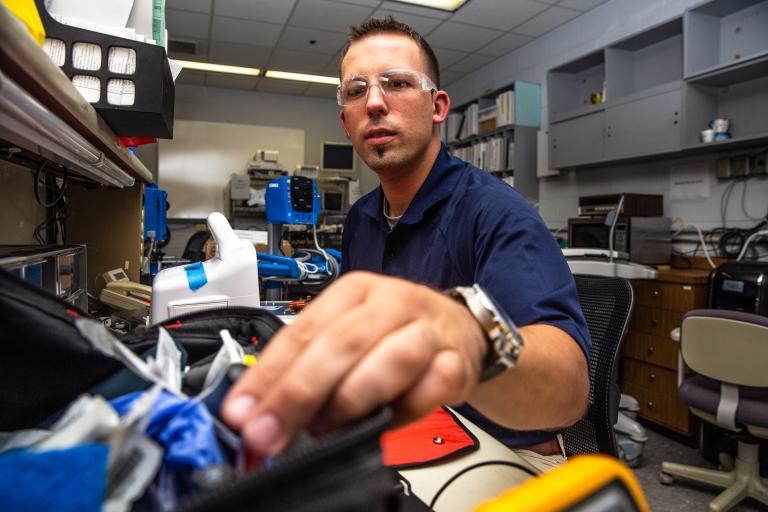
Years ago, before I began working in the healthcare industry, my perception of a healthcare team was limited. If asked to define who was involved in my patient care, I likely would have mentioned physicians, PAs, NPs, nurses, and medical assistants.
Now, having spent more than two decades in the industry, I would broaden my answer to include many nonclinical team members, whose efforts are indirect, yet touch the lives of countless patients. At the top of my list alongside the clinicians? Hospital clinical engineers.
Clinical engineers—who are also often referred to as biomeds, biomedical engineers, or biomedical equipment technicians—are an integral component of patient care delivery and patient safety. They are responsible for servicing nearly every piece of equipment that touches patients within a hospital or health system, and they are tasked with ensuring the clinical team has the right equipment, in the right place, at the right time—every time.
Yet, many people outside of healthcare are unaware of how critical their role is, or even that their role exists at all.
We recently discussed this lack of awareness during an interview with a clinical engineer for a project being conducted by the GE HealthCare Patient Care Solutions Services team. “Sometimes I feel like we're the unsung hero,” the individual told us. “When I tell people I’m a biomed, they have no idea what that means”[1].
What does it mean? Perhaps one of the most effective ways to explain it is to consider what a hospital or health system without clinical engineers would be like. It’s scary to contemplate.
- Without clinical engineers, catastrophic equipment failures, such as anesthesiology machines failing during patient surgeries, would be commonplace. Why? Because there would not be any clinical engineers to provide ongoing medical device maintenance to ensure equipment is running properly.
- Without clinical engineers, critical care delays, such as a patient’s heart surgery being postponed, would occur frequently. Why? Because there would not be any clinical engineers available to quickly repair medical equipment when problems arise.
- Without clinical engineers, nurses, physicians, and other clinical team members would struggle to harness the full potential of patient care-enhancing equipment. Why? Because there would not be any clinical engineers to train them and advise them on safe and effective utilization.
There are many other examples I could share, but all drive home the point: Clinical engineers are critical members of the healthcare team—and more hospital and health system leaders should be highlighting their contributions on a regular basis.
As part of that previously mentioned GE HealthCare Patient Care Solutions Services team project, we interviewed clinical engineers from across the country. Nearly all mentioned that they are dealing with an influx of increasingly connected medical devices and heightened medical device cybersecurity threats[2].
At the same time, many clinical engineers are also facing staffing and resource shortages—particularly when it comes to finding team members with the deep expertise required to help confront these challenges. As one of the individuals we interviewed told us, “We've been pretty well-resourced as far as staffing goes, as far as approval to hire, but it’s been a challenge to fill and retain”[3].
That’s not surprising given the ongoing decline in the number of clinical engineer training and certification programs. According to Danielle McGeary, Vice President of Healthcare Technology at AAMI, a national association for clinical engineers and other healthcare technology management professionals, many training programs across the country are closing, leaving multiple states with decreasing talent pipelines[4].
Raising awareness of the role clinical engineers play in care delivery would go a long way toward increasing demand for, and interest in, training programs. Even highlighting this profession to high schoolers could drive interest in this field. In the meantime, hospital and health system leaders need to consider alternate approaches to fully support their clinical engineers during this challenging time.
Mark Huy, a Clinical Engineer with GE HealthCare , recently wrote about these challenges [5], and shared some solutions hospital and health system leaders should consider, including providing clinical engineers with more specialized medical device training, helping them move beyond a “break-fix” approach to proactive medical device maintenance, and ramping up services agreements with outside partners that reinforce in-house engineers with people, parts, and productivity tools[6]. All are great recommendations.
I also urge hospitals, health systems, and clinical engineers to participate in this year’s annual Healthcare Technology Management Week, put forth by AAMI. Held May 19-25, the week promotes awareness of—and appreciation for—the critical work of professionals who manage and maintain the vast assortment of technology that healthcare delivery organizations operate and rely heavily upon.
Remember that even the smallest gestures—such as a thank you within your organization—can speak volumes to this often under-recognized but extremely valuable group of healthcare team members. While Healthcare Technology Management Week is an excellent time to begin sharing your gratitude, there are myriad ways to showcase your thanks all year long. Broader organizational investments in training, streamlining workflows, security tools, and other external resources reinforce your gratitude with initiatives that support their daily efforts, and help highlight the importance of the work they do. Clinical engineers need and deserve recognition year-round—it’s high time we “sing” the praises of these indispensable care team members.
We at GE HealthCare want to personally thank you, the clinical engineer, for all you do. We look forward to supporting you today and far into the future - learn more about GE HealthCare Patient Care Solutions Services.
Sources:
1. Double-blinded research interviews conducted independently by Sage Growth Partners in March and April 2024
2. Three critical challenges hospital and health system clinical engineers are facing and how to overcome them, GE HealthCare
3. Double-blinded research interviews conducted independently by Sage Growth Partners in March and April 2024
4. Shortage of biomed techs could lead to a crisis in patient safety, UpNorthLive/ABC
https://upnorthlive.com/news/local/shortage-of-biomed-techs-could-lead-to-a-crisis-in-patient-safety
5. Three critical challenges hospital and health system biomedical engineers are facing and how to overcome them, GE HealthCare
6. How to Overcome Clinical Engineering Challenges: 4 Strategies for Hospital Leaders and Clinical Engineers, GE HealthCare

Kristen Suessmann
Kristen Suessmann, Senior Director – Healthcare Technology Management (HTM), GE HealthCare
Kristen began her 24-year career at GE Healthcare (GEHC) in the Financial Management Program. She held various roles in finance before transitioning to a consulting role in GE Healthcare Partners. Kristen spent a decade working extensively with hospitals, transforming operational processes, and providing strategic guidance on patient flow improvements.
She held various commercial and operational roles supporting a breadth of GEHC products such as DoseWatch, AgileTrac and Hospital Operations Management program. Kristen then joined the GEHC Service Technology team and was responsible for the rollout of the biomed platform, Nuvolo, and providing field support for all biomed software. She led the HTM Experience team and was responsible for the RTLS installation team, Service Value Growth programs and developing the Asset Management offering. She then transitioned to the Enterprise Solutions team as a Senior Manager, responsible for developing unique solution bundles for targeted GEHC customer partnerships. Kristen has extensive experience in change management, workflow transformations and project management.
Kristen now leads the central GE HealthCare HTM Operations team which provides strategic guidance and support (Quality, Process, Billing, Parts, Tools, Test Equipment and Training) to regional and field teams.
She holds a bachelor’s degree from the University of Notre Dame, an Executive M.B.A. from the University of Texas at Austin and is a Lean Six Sigma Black Belt.

